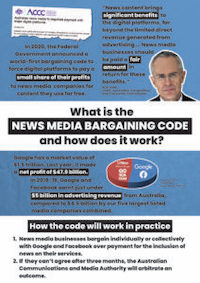MEAA video message on YouTube.
Asia Pacific Report newsdesk
The Media Entertainment and Arts Alliance (MEAA) union is reconsidering its involvement in the Australian Press Council and has appealed to members to give feedback on this issue.
Vice-president media Karen Percy has appealed to delegates on a YouTube video to take part in this consultation.
“Members have raised concerns about the lack of financial transparency at the Press Council and rulings that are increasingly out of step with community expectations,” she said.
- READ MORE: Facebook and Google deals may leave small publishers out in the cold
- Download the media bargaining code
If the MEAA leaves, it needs to give four years notice “to end our contributions”, which last year were more than A$100,000.
“That four years gives us time to look at alternative regulatory options, and that’s in line with the MEAA submission to the Senate Inquiry into media diversity which proposes a single entity for self-regulation,” said Percy.
Meanwhile, the MEAA says in a recent statement on its website that Facebook’s recent “ham-fisted handling of its news sharing ban” in Australia – which initially blocked crucial community information and health and government information sites – had revealed the real dangers of an organisation that “abuses its dominant position” and “thumbs its nose at rules and regulations”.

Last month’s decision by Facebook to unilaterally ban news on hundreds of Australian pages was “the arrogant act of a company with too much power that thinks it is beyond the reach of any government”, the statement said.
Facebook was acting in retaliation to the proposed News Media Bargaining Code, which would force it and Google to compensate media outlets for content that until now has been published on their platforms for free.
While Australia’s News Media Bargaining Code was not a silver bullet to fix the problems within the news media, it was an important step to address the “blatant imbalance between the digital giants” and those who produced public interest news content.











































